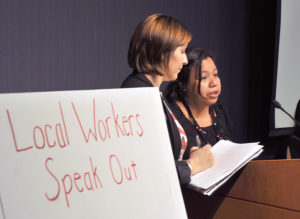By Lindsay Steele
The Catholic Messenger
IOWA CITY — Tre, a teenager from the Iowa City area, said he was thrilled to have earned a job mowing lawns and trimming trees with his younger brother last summer, but after working two weeks in the hot sun, their employer refused to pay them.

Marcela Marquez, right, president of the Center for Worker Justice of Eastern Iowa, and Misty Rebik, executive director, speak at the Local Workers Speak Out forum at the Iowa City Public Library Sept. 11.
With help from the Center for Worker Justice of Eastern Iowa, the brothers were able to receive their wages, and on Sept. 11, Tre spoke out at a public forum on worker justice issues in hopes of raising awareness of stories like his. “No one should have to go through what I went through,” Tre told the crowd of about 100 at the Iowa City Public Library, using only his first name in order to protect his anonymity.
Six workers gave testimony at the Local Workers Speak Out forum, highlighting issues in traditionally low-wage jobs including poverty wages, temporary work, wage theft, unpredictable schedules and discrimination. Later, panelists including Kent Ferris, diocesan social action director, shared their perspectives and observations in relation to the workers’ testimonies. The forum was presented by the Center for Worker Justice of Eastern Iowa and the Iowa City Federation of Labor.
Workers speaking at the forum expressed feeling as if they were not respected by their employers, and could not express concerns without fear of retaliation or being fired. Many expressed the challenges of trying to raise a family on minimum wage. Fast food worker Fanai encouraged the crowd to help advocate not just for a higher minimum wage but eventually a “livable wage.”
Those working for temporary labor agencies expressed frustration at having to report to an office and wait each day, unsure if they would receive work. “You can’t plan anything with your family,” said speaker Effron about the unpredictable schedule and income.
After the testimonies, members of the Center for Worker Justice of Eastern Iowa held up signs depicting the five priorities they believe will help typically low-wage workers: the right to form a union, livable wages, getting paid on time and with a pay stub, secure schedules, and workplaces free of discrimination.
During the panel discussion, Iowa State Rep. Kirsten Running-Marquardt, a Democrat, said passing legislation that favors low-wage workers has been a challenge. She encouraged people to share their concerns with their local legislators. “Please talk to your state representatives, talk to your state senators and say this is an important issue for you and your family,” she pleaded, her voice breaking with emotion.
Ferris told the crowd that, despite religious differences people may have, justice — including economic justice — is a common language. “I have a responsibility in serving Bishop Martin Amos of the Diocese of Davenport to try to inform and educate 100,000 Catholics as to how to take their faith and live it on a daily basis. … All people of good faith and people of good will have a responsibility to understand that in order to advance the common good we need to take into account what is being asked (tonight), understand that it is reasonable, and we’re all so much better off as a result.”
Later, he told The Catholic Messenger that parishes often ask for advice on serving the poor — usually with their immediate needs such as food and clothing — but that most parishioners do not get an opportunity to hear stories on why the people they are serving need help in the first place. “Stories like these are invaluable for us to understand the needs as well as how we can respond,” he said.








